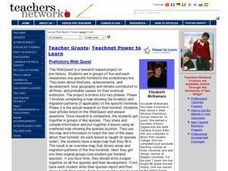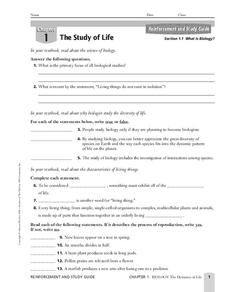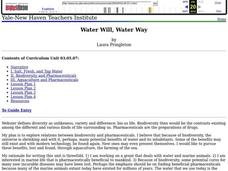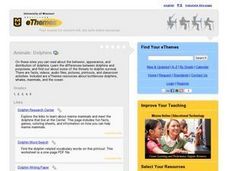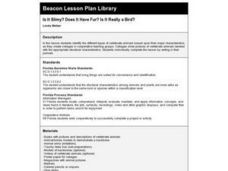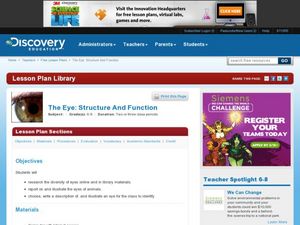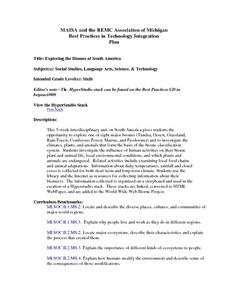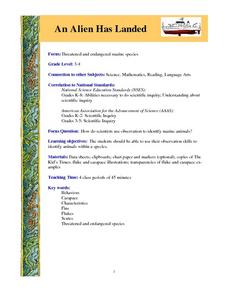Curated OER
Animals and Humans Say the Darnedest Things
Students explore and analyze human and animal communications and create a short film that illustrates their findings.
Curated OER
Classification of an Invertebrate: Sponge
Students investigate the invertebrate sponge. In this invertebrates lesson plan, students observe the sponge, Grantia, using a dissecting microscope. Students answer questions about their observations and view six other invertebrates....
Curated OER
Investigating Animals in Water
Students observe small animal activity. They identify local water animals and describe the habitats where water animals can be found. Students collect samples to observe in the classroom.
Curated OER
Sort Laboratory Practice
Eighth graders sort animals according to certain physical characteristics. In this science lesson, 8th graders explain the reason for such classification. They complete a worksheet individually at the end of the lesson.
Curated OER
Galapagos: Beyond Darwin
Students identify plants and animals endemic in their local area after learning about the plants and animals of the Galapagos Islands. For this plants and animals lesson plan, students create an endemic garden on school grounds.
Curated OER
Who's Who?
Students explore biology by identifying animals and their environments. In this animal characteristic lesson, students read assigned text about farm animals, how they are raised, and what they are used for in our society. Students view a...
Curated OER
Invertebrates and Vertebrate Evolution
Learners explore the major characteristics of the major animal phyla. They describe adaptive features that have contributed to the success of animals on land. Students explain how primate evolution provides a context for understanding...
Curated OER
Prehistory Web Quest
Sixth graders identify how geography and climate determine the lives of early hominids, the characteristics of hunter-gatherer societies, how animals affected the lives of early hominids, and how hominids overcame their physical...
Curated OER
What is Biology?
For this science of biology worksheet, students will review the concepts relating to biology including the characteristics of living things, the process of reproduction, adaptations, and evolution. This worksheet has 5 short answer, 3...
Curated OER
Identifying Vertebrates
In this biology worksheet, students look for the answers to how to classify animals. They specifically focus upon the vertebrates while differentiating the characteristics from other organisms.
Curated OER
What's the Difference?
Students analyze the similarities in different species. This lesson is part of a multi-segmented unit on the diversity of life. In this segment, students classify shoes to mimic the scientific categories of the classification system.
Curated OER
Tic Tac Know Kingdoms
In this PowerPoint, students participate in a variation of tic tac toe in which questions about the animal and plant kingdom are presented and students move to various locations on the game board.
National First Ladies' Library
How Do Flowers Get Their Names?
Students study Carolus Linnaeus and his classification system of plants. They examine the origin of both both common and scientific names of flowers. They speculate how their favorite flowers came to be named and brainstorm about the...
Curated OER
Water Will, Water Way
Students test tap water for hardness and mineral content. In this environmental science lesson, students identify the different stages of the water cycle. They classify plant and animals according to the rules of taxonomy.
Curated OER
How Animals Prepare for Winter
Second graders study which animal hibernate and which migrate. They observe the weather conditions related to each and complete the associated worksheets and web activity.
Curated OER
Animals: Dolphins
Students use the internet to discover information about dolphins. They examine their behavior, appearance and distribution of dolphins.
Curated OER
Arizona Plant Booklet: An Introduction to Arizona Plants & Cacti
Students explore variety of plants & cacti in their Arizona community by collecting samples and taking photographs. Can be adapted to other areas.
Lerner Publishing
Meet the Dinosaurs
Take your class of youngsters on a prehistoric adventure with this four-lesson series on dinosaurs. Accompanying the Meet the Dinosaurs books by Don Lessem, these lessons engage children in writing their own dinosaur books,...
New South Wales Department of Education
Plant Features
Pine needles are actually modified leaves. In the 16th installment of 20, young scientists explore plants. Through an analysis of leaves — shape, veins, and edges — pupils see how to classify plants based on structural features.
Curated OER
Is It Slimy? Does It Have Fur? Is It Really a Bird?
Sixth graders identify the different types of vertebrate animals based upon their major characteristics, as they create collages in groups. Collages show pictures of vertebrate animals labeled with the appropriate structural...
Curated OER
The Eye; Structure and Function
Students research the structure and function of the eye. In this anatomy lesson, students write a report about the eye and draw an illustration. They research a particular animal's eye then present their findings to the class without...
Curated OER
Exploring the Biomes of South America
Sixth graders complete a five-week unit investigating the eight major biomes of South America. They conduct Internet research, collect short-term and long-term climate data, and create a HyperStudio slideshow stack about a selected biome...
Curated OER
Changing With the Tide
Students research and they role-play the behavior of plants and animals in a salt marsh habitat as the tides change.
Curated OER
An Alien Has Landed
Students identify animals within a species by using their observation skills to record information, such as behavioral characteristics.









